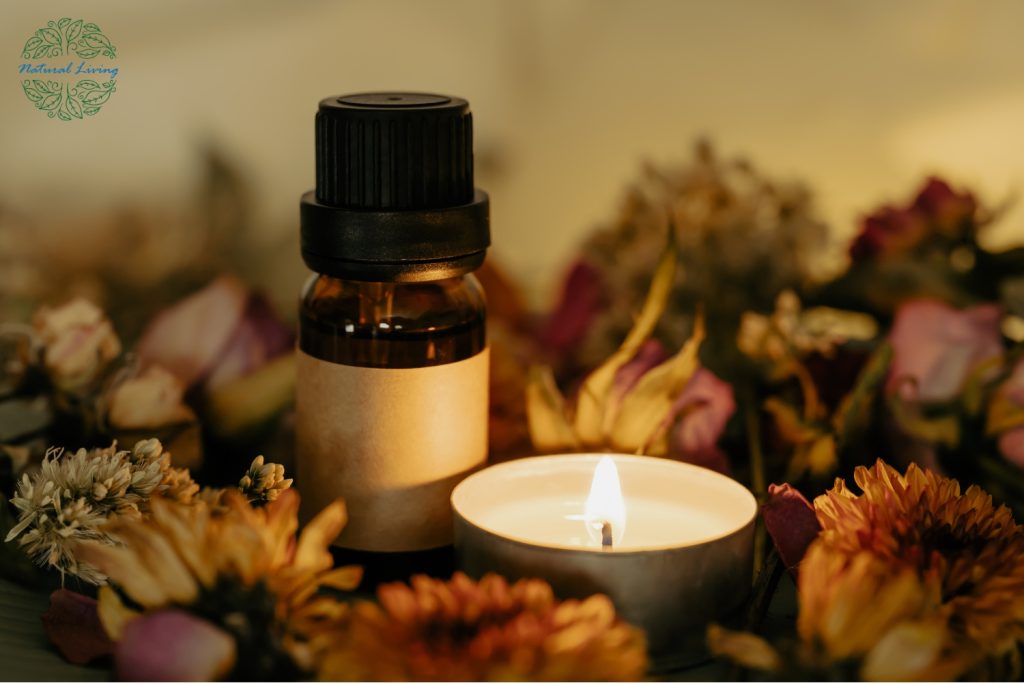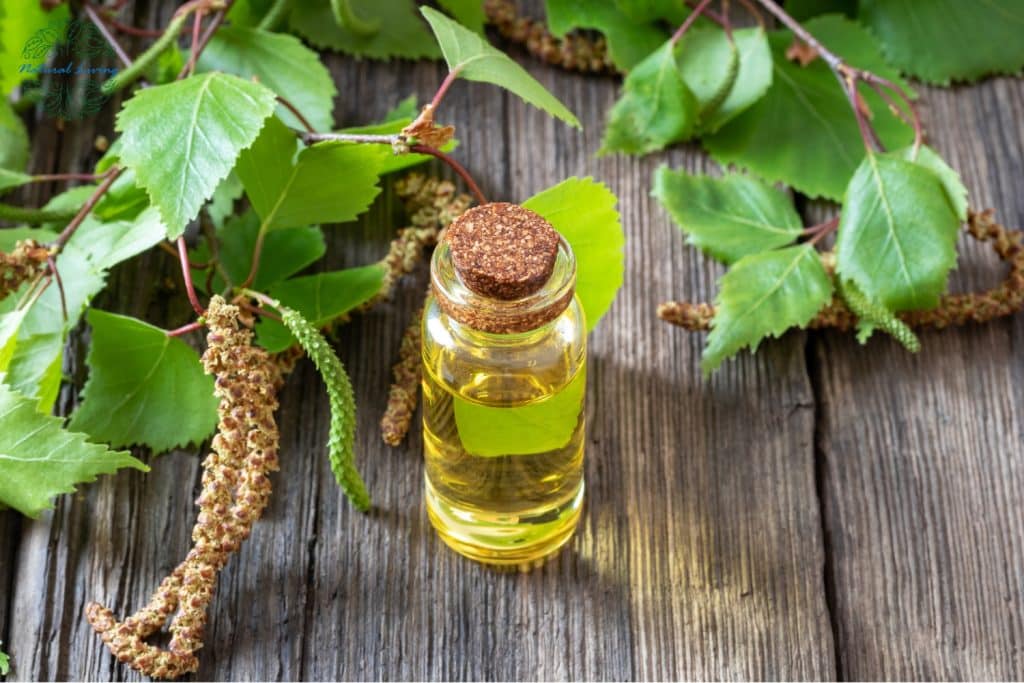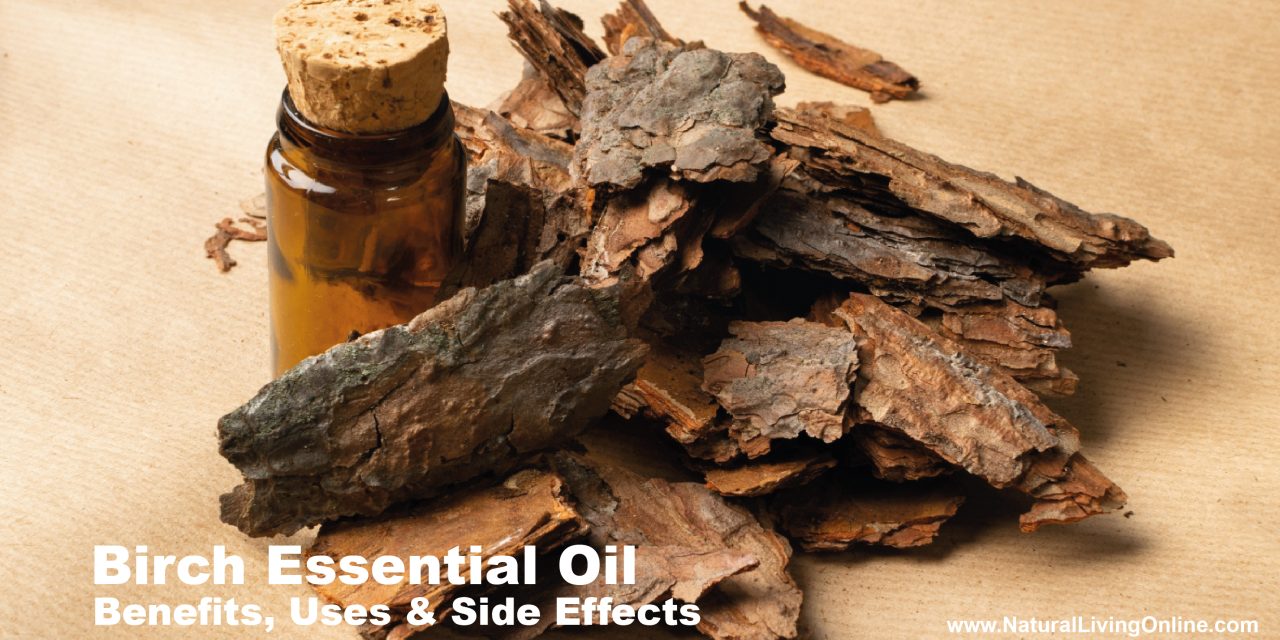Birch essential oil is derived from the bark of birch trees like Betula lenta and Betula alba. It is known for its versatile applications. It boasts numerous health benefits, including alleviating pain, enhancing skin health, and promoting relaxation. People often use it in aromatherapy to ease tension and improve their mood.
The oil’s therapeutic properties make it a valuable addition to any wellness routine. Birch essential oil can assist with reducing inflammation, improving circulation, and even cleansing the air when diffused. It’s also renowned for its cleansing and purifying effects on the body, making it a popular choice for detox purposes.
However, like any essential oil, it’s crucial to be aware of potential side effects. Some individuals may experience skin irritation or allergic reactions. It’s always advisable to perform a patch test and consult with a healthcare provider before incorporating birch essential oil into regular use.
Key Takeaways
- Birch essential oil offers multiple health benefits like pain relief and skin enhancement.
- It is effective for improving circulation and detoxification.
- Always check for potential side effects such as skin irritation.
History and Origins

Birch essential oil, often derived from the bark of the Betula lenta species, has a rich history. This tree, also known as cherry birch or sweet birch, is native to North America. The indigenous people of North America have long used birch bark for its medicinal properties.
Types of Birch:
- Black Birch (Betula lenta)
- White Birch (Betula papyrifera)
- Silver Birch (Betula pendula)
Key Regions:
- Eastern United States
- Canada
Birch trees, especially Betula lenta, were traditionally used by Native Americans to make canoes, baskets, and as a food source. Birch bark has also been utilized for its analgesic and anti-inflammatory properties.
In modern times, birch oil is extracted through steam distillation of the tree’s bark. This oil is rich in methyl salicylate, a compound known for its pain-relieving qualities. It’s often used in aromatherapy and massage.
Historical Uses:
- Medicinal: Pain relief, anti-inflammatory
- Practical: Canoes, containers
The prominence of birch in both practical and medicinal uses highlights its versatility and importance throughout history.
Birch Essential Oil Profile
Botanical Names: Betula lenta (Sweet Birch) and Betula alba (White Birch or Silver Birch)
Family: Betulaceae
Common Names: Birch oil, Sweet birch oil, Black birch oil
Plant Description: Birch trees are deciduous trees native to North America (Sweet Birch) and Europe (White Birch). They are known for their characteristic smooth, white or black bark that peels in thin layers. The trees can grow up to 25 meters (82 feet) tall, producing small, catkin-like flowers and triangular-shaped leaves.
Oil Description: Birch essential oil is extracted from the bark of the birch tree. It has a clear to pale yellow color and a strong, sweet, minty aroma reminiscent of wintergreen. The two most commonly used varieties in essential oil production are Sweet Birch (Betula lenta) and White Birch (Betula alba).
Chemical Composition
Birch essential oil contains several active compounds, with the key component being methyl salicylate, which is similar to wintergreen oil. The primary constituents include:
- Methyl salicylate (up to 98%)
- Salicylic acid
- Betulene
- Gaultherin
- Betulinic acid
Properties
- Analgesic: Provides pain relief by reducing pain sensation.
- Anti-inflammatory: Reduces inflammation and swelling.
- Antirheumatic: Helps alleviate symptoms of rheumatism and arthritis.
- Astringent: Tightens and tones the skin, making it beneficial for skin conditions.
- Diuretic: Promotes the excretion of excess water and toxins from the body.
- Febrifuge: Reduces fever by promoting sweating.
- Antiseptic: Disinfects wounds and prevents infection.
Extraction Process
Birch essential oil is extracted primarily through steam distillation. This method is chosen for its efficiency in retaining the oil’s therapeutic qualities. The process involves heating water to produce steam, which then passes through the birch bark. The steam helps to release the oil.
After collecting the steam, it is cooled to condense back into water and oil. The oil is then separated and collected. This method ensures that the essential components, such as methyl salicylate, are preserved in the final product.
The extraction is carefully monitored to maintain purity and potency. Both white birch and silver birch can be used, although white birch is more common due to its higher oil yield.
Therapeutic Properties and Uses

Birch essential oil is known for its wide range of benefits. Among these are its analgesic and anti-inflammatory effects, use in aromatherapy and respiratory support, and skin and hair care applications.
Analgesic and Anti-Inflammatory Effects
Birch essential oil is a natural analgesic and anti-inflammatory. It can help alleviate pain due to arthritis and other aches. Massaging diluted birch oil onto sore areas can reduce pain and inflammation.
For a massage, mix birch oil with a carrier oil like coconut or jojoba. Massaging this blend into the skin can provide relief from muscle pain and reduce stiffness. This makes it especially beneficial for those with arthritis or chronic pain conditions.
Aromatherapy and Respiratory Support
Birch essential oil is beneficial in aromatherapy for promoting mental clarity and overall well-being. It is often used in a diffuser to freshen the air and improve mood.
Inhaling birch oil can also support respiratory health. It can help open clogged breathing passages and alleviate symptoms of bronchial infections. Adding a few drops to a warm bath or inhaler can provide relief during colds or sinus infections.
Skin and Hair Care
Birch essential oil supports skin conditions like eczema and psoriasis. Its astringent properties help tone the skin, giving it a firmer appearance. Diluting birch oil with a carrier oil and applying it to the skin can rejuvenate dull or aged skin.
For hair care, birch oil can be used to combat dandruff and promote hair growth. Massaging the scalp with birch oil mixed with a carrier oil can stimulate hair follicles and reduce scalp irritation. This can lead to healthier, shinier hair over time.
Making birch essential oil a part of your skin and hair care routine can help address common issues and improve overall appearance and health.
Benefits for Circulation and Detoxification

Birch essential oil has significant benefits for improving blood circulation and aiding in detoxification. It can help reduce issues like muscle and joint pain due to its stimulating and clearing properties.
Improving Blood Circulation
Birch essential oil is known to enhance blood circulation. By stimulating blood flow, it helps supply oxygen and nutrients to the body’s tissues. Improved circulation can reduce edema, which is the swelling caused by excess fluid trapped in the body’s tissues. This can also alleviate muscle pain and joint pain, making it useful for those with arthritis or similar conditions.
Regular application or inhalation of this oil can help keep the blood circulation more efficient. Massage therapy using birch essential oil is especially effective in stimulating blood flow, providing relief from stiffness and maintaining healthy skin texture.
Detoxifying Properties
Birch essential oil is effective in detoxifying the body. It stimulates the elimination of toxins through sweat, urine, and excrement. The detoxifying action can help cleanse the body of harmful substances and maintain overall health. This helps in reducing the burden on key organs like the liver and kidneys.
The oil also acts as a diuretic, promoting the frequent and easy passing of urine. This helps the body get rid of excess salts, fats, and water, which can reduce bloating and the chance of developing edema. This attribute makes birch essential oil a powerful component in maintaining internal cleanliness and balance.
Precautions and Potential Side Effects
When using birch essential oil, it’s crucial to understand the potential risks and take necessary precautions. Proper dilution, awareness of allergies, and special considerations for pregnant or nursing women are vital.
Allergies and Skin Sensitivity
Birch essential oil can cause skin irritation or allergic reactions in some individuals. It is recommended to perform a patch test before applying the oil to larger skin areas. To conduct a patch test, mix a few drops of birch oil with a carrier oil (like coconut or jojoba oil) and apply a small amount to a patch of skin. Wait 24 hours to check for any adverse reactions like redness, itching, or swelling. Avoid using birch essential oil on broken or sensitive skin to minimize the risk of irritation.
Use During Pregnancy and Nursing
Pregnant and nursing women should be cautious when using birch essential oil. The safety of using this oil during pregnancy and breastfeeding is not well-established. Some components of birch oil, such as methyl salicylate, can be particularly potent. Therefore, it is advisable to consult with a healthcare provider before using birch oil during these periods. This precaution helps protect the baby and the mother from possible adverse effects.
Toxicity and Proper Dilution
Birch essential oil contains compounds like methyl salicylate, which can be toxic if used improperly. It is essential to always dilute birch oil with a carrier oil before topical application to make it safe for the skin. A common dilution ratio is to add 3-5 drops of birch oil per 1 ounce of carrier oil. This ensures that the oil is not too concentrated, reducing the risk of toxic effects. Additionally, birch essential oil should be kept out of reach of children to prevent accidental ingestion, which can be dangerous.
Frequently Asked Questions
What are the known skin benefits of birch essential oil?
Birch essential oil is rich in antioxidants and nutrients that can deeply moisturize and nourish the skin, keeping it soft and hydrated. Its antibacterial properties help combat acne-causing bacteria. Additionally, its astringent components tighten the skin, giving it a more youthful appearance.
In what ways can birch oil be used medicinally?
Birch essential oil can help relieve pain by stimulating nerves and opening blood vessels. It is also beneficial for respiratory issues, as inhaling the oil can open clogged breathing passages from the lungs to the sinuses. The oil’s ability to ease tension and migraines makes it a good choice for aromatherapy.
Are there any side effects associated with consuming birch juice?
Birch juice can cause allergic reactions in some people. It should be consumed with caution, especially if one has a known allergy to birch pollen. Potential side effects include skin rashes, stomach discomfort, and other allergic reactions.
How can birch bark improve hair health?
Birch essential oil can help balance combination skin and improve the condition of dull and aged skin. When used on hair, it can be added to water or other hair treatment solutions for its astringent properties to help tone the skin and tighten the muscles.
What potential side effects should one be aware of when drinking birch bark tea?
Drinking birch bark tea can lead to side effects such as allergic reactions, stomach issues, and skin rashes. Those with a known birch pollen allergy should avoid it. It’s important to monitor for any adverse reactions and consult a healthcare provider if any symptoms occur.
What are some recognized effects of birch essential oil on the body?
Birch essential oil reduces pain, eases tension and migraines, and helps in respiratory relief. It also has invigorating and relaxing properties that promote a sense of calm and relaxation. When diffused, birch essential oil purifies the air, creating a fresh and clean environment.
References:
Authentication and Market Survey of Sweet Birch (Betula lenta L.) Essential Oil
This website does not provide medical advice.
All information provided on this website, and on associated social media networks, including but not limited to texts, images, and numbers are for general information purpose only. It is not intended as medical advice and it does not include all possible precautions, side effects, or interactions that may occur. Neither NaturalLivingOnline.com nor its author/founder take responsibility for how you use this information. Statements contained on NaturalLivingOnline.com have not been evaluated by the FDA. You should conduct thorough research via multiple sources and consult your physician or qualified doctor before using any essential oil or herbal remedy. Information on NaturalLivingOnline.com must not be relied upon for medical, legal, financial or other decisions.













